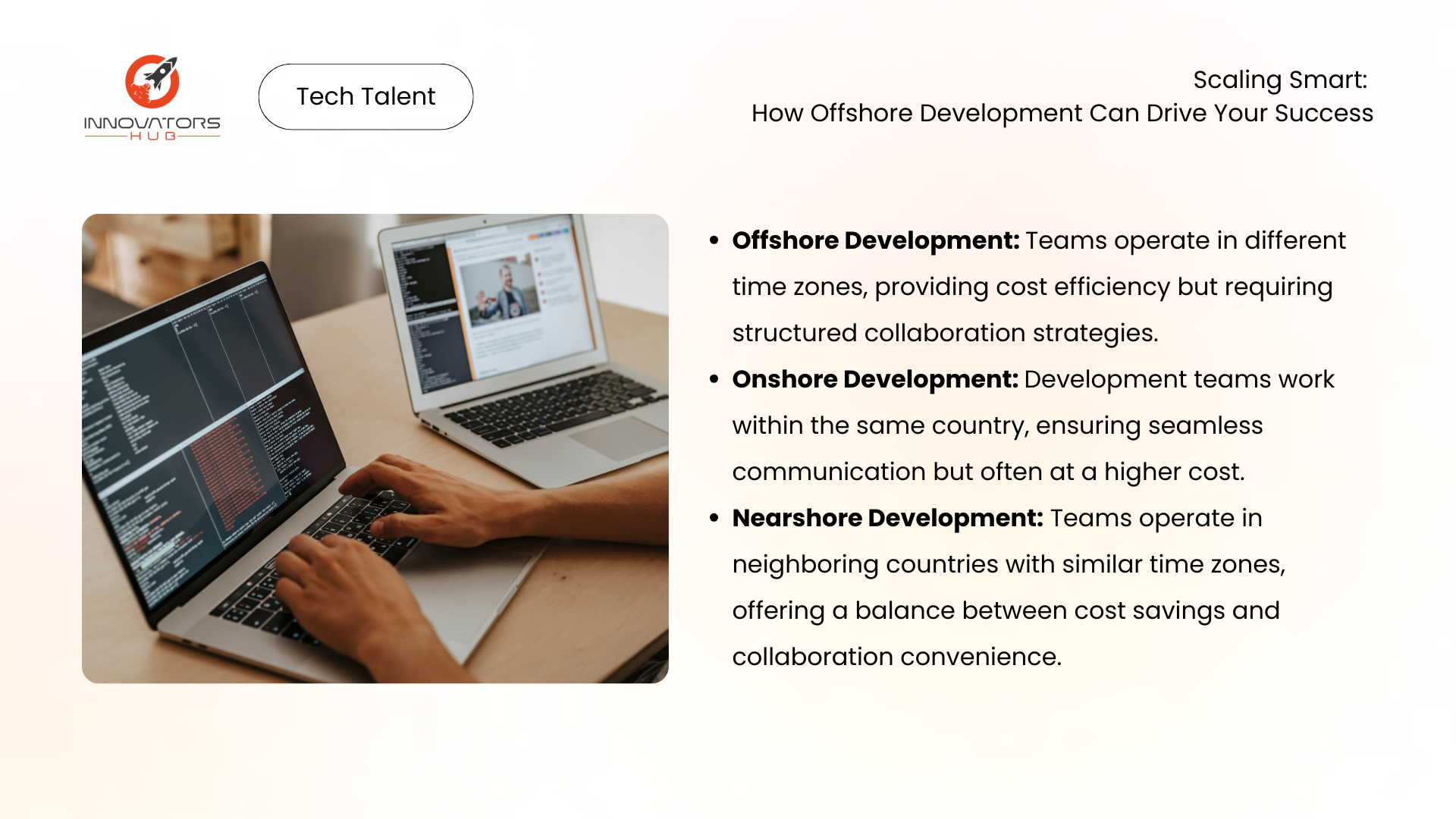As businesses seek to enhance efficiency and optimize costs, offshore software development has become a vital strategy for scaling operations and accessing specialized talent. With the global outsourcing market projected to reach nearly $905 billion by 2027, companies worldwide are leveraging offshore development teams to drive digital transformation.
This guide explores the key benefits, challenges, and best practices for successful offshore software development, helping businesses navigate this transformative approach effectively.

What is Offshore Software Development?
Offshore software development refers to outsourcing software projects to teams located in different countries, often in regions with lower operational costs and high technical expertise. Companies choose offshore development for cost savings, talent acquisition, and scalability while balancing challenges like communication barriers and time zone differences.
Comparing Offshore, Onshore, and Nearshore Development
- Offshore Development: Teams operate in different time zones, providing cost efficiency but requiring structured collaboration strategies.
- Onshore Development: Development teams work within the same country, ensuring seamless communication but often at a higher cost.
- Nearshore Development: Teams operate in neighboring countries with similar time zones, offering a balance between cost savings and collaboration convenience.

Benefits of Offshore Software Development
1. Cost Efficiency
Companies can significantly reduce development costs by outsourcing to regions with lower labor expenses, freeing up budgets for innovation and business expansion.
2. Access to Global Talent
Offshore development allows businesses to tap into a diverse talent pool, ensuring they can source experts with niche skills without geographical limitations.
3. Scalability & Flexibility
Organizations can easily scale their offshore teams up or down based on project requirements, reducing the overhead costs of maintaining in-house teams.
4. Faster Time-to-Market
With development teams working across different time zones, offshore projects benefit from round-the-clock development cycles, accelerating delivery timelines.
5. Focus on Core Business Activities
Outsourcing software development allows companies to allocate internal resources towards strategic growth while relying on offshore teams for technical execution.
Challenges of Offshore Software Development
1. Communication Barriers
Differences in language and communication styles can create misunderstandings, making it essential to establish clear documentation and structured workflows.
2. Time Zone Differences
Coordination across different time zones can be challenging. Scheduling overlapping work hours and using collaboration tools can help streamline communication.
3. Quality Assurance & Compliance
Ensuring offshore teams adhere to development standards, coding practices, and security compliance requires robust quality control mechanisms.
4. Cultural Differences
Work ethics and business practices vary across regions. Establishing clear expectations and fostering cultural awareness can mitigate potential friction.

Best Practices for Offshore Software Development Success
1. Establish Clear Communication Channels
Use collaboration tools like Slack, Zoom, and Microsoft Teams to ensure seamless interaction across teams.
2. Define Goals & Expectations Early
Outline project milestones, deliverables, and key performance indicators to align offshore teams with business objectives.
3. Implement Agile Methodologies
Utilize Scrum or Kanban frameworks to maintain transparency, track progress, and enable iterative development cycles.
4. Conduct Regular Performance Reviews
Assess project status through weekly check-ins, sprint reviews, and retrospective meetings to address challenges proactively.
5. Foster Strong Team Relationships
Encourage cross-team collaboration and engagement through virtual team-building activities and cultural awareness training.
Choosing the Right Offshore Software Development Partner
Selecting a reliable offshore development partner is crucial for success. Consider the following factors:
- Technical Expertise: Ensure the partner has proven experience in your industry and relevant technologies.
- Communication & Collaboration: Assess the team’s language proficiency and ability to work within structured workflows.
- Quality Assurance & Security Compliance: Verify adherence to industry standards and security protocols.
- Project Management Approach: Opt for partners that use Agile methodologies and provide clear project roadmaps.
Offshore Software Development in Key Regions
Different regions offer unique advantages for offshore software development:
- Eastern Europe (Poland, Ukraine, Romania): Strong engineering talent and time zone proximity to Western markets.
- Asia (India, Vietnam, the Philippines): Cost-effective development with a large pool of skilled professionals.
- Latin America (Brazil, Argentina, Mexico): Cultural and time zone alignment with North American businesses.
Cost Considerations in Offshore Development
The cost of offshore software development varies based on:
- Developer Experience: Senior developers command higher rates than junior developers.
- Project Complexity: Advanced solutions like AI or blockchain require greater investment.
- Region: Hourly rates differ significantly across regions, with Asia generally being more cost-effective than Europe or North America.
- Hidden Costs: Consider additional expenses such as legal fees, compliance management, and knowledge transfer.
When to Use Offshore Software Development
Businesses should consider offshore development in the following scenarios:
- Scaling Development Capacity: When in-house teams lack bandwidth for additional projects.
- Accessing Specialized Expertise: When niche technical skills are required.
- Cost Optimization: When budget constraints necessitate cost-effective development solutions.
- Round-the-Clock Development: When continuous workflow acceleration is a priority.
The bottom line
Offshore software development provides businesses with a competitive advantage by offering cost savings, access to top global talent, and enhanced scalability. While challenges exist, implementing best practices and choosing the right development partner can ensure successful project outcomes.
About Innovators Hub Asia
Innovators Hub Asia is an innovative technology system that combines 2,000 top innovators and tech talents and cutting-edge technology to deliver AI-driven solutions tailored to the business’s unique challenges. It aims to revolutionize business operations and accelerate growth through a wide range of services, including aiLabs, TalentCloud, Tech Venture Builder, and Co-Innovation Builder.






